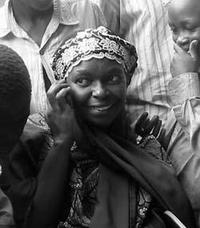July 7, 2004
Information Communication Technology for Developing Countries

|
This was a talk presented at Intel Research Seattle by James Dailey from the Grameen Technology Center in Seattle WA. Mr. Dailey spoke about emerging technologies in the developing world. His aim was to technologically empower the "bottom of the pyramid" (meaning the lowest economic strata) in an economically viable way. This is in contrast to most technology which markets to the top economic strata. GTC was started 6-7 years ago to promote their principles world-wide. |
- Scaling up micro-finance with technology. (some stats about micro-finance as implemented by the "Grameen bank" (not sure what that is): 96% women borrowers, 90% repayment rate)
- The Village Phone run by a local entrepreneur. (These seemed to be a particular instance of a micro-finance operation that GTC was involving themselves in, or liked or something)
- Remote transactions that create an ATM-like device that works with cell-phones and web browsers because the ATM model doesn't work in developing countries, and poor transportation infrastructure restricts remote physical payments.
Aspects of business models that they endorse include shared access (computer cafe' model), a focus on entrepreneurs, add value to communities and financial sustainability.
Challenges include lack of capital, high illiteracy, cultural barriers, poor infrastructure (electricity/phone lines).
Scaling up micro-finance can be aided by credit bureaus, remote transactions (no ATMS exist), remote data collection, guaranteeing identity, agent models (allowing people to act as your agent), and intermediation.
MOAP (Micro-finance Open Architecture Project) is a vision to support micro-finance with open source software and open standards.
My opinion of this talk was that it was heavy on vision and light on actual research. There were some clear points made about why current technologies won't work in the developing world, and some potential solutions (primarily cell phones), but it wasn't at all clear what steps GTC was making to push the technology other than by identifying challenges. I didn't get any idea of what GTC's role was in any real micro-finance operation. I wasn't sure if the Village Phone was an idea they liked, or a real implemented program in the field and I was pretty sure that the remote transaction with cell-phones was just an idea.
More generally I wasn't convinced that the overall vision was sound. It seemed to me that GTC's direction was to replicate the developed world with alternative technologies, yet at the same time there was a contrasting discussion about how the developing world was free to reinvent structures that wouldn't work for them. For example, Mr. Dailey suggested establishing credit bureaus and implementing strong government sponsored identity guarantees. I'm not sure that the best thing for countries where human rights are frequently abhorrent and semi-organized crime is rampant is to establish credit reporting data centers and strong identity control and tracking under a central agency's control.
In an effort to understand the vision more, I asked why 96% of the micro-finance recipients were women. The answer was a blend of memes including "men want more money", "men don't repay loans as well", and "this is also about empowering women". All of these issues may be true, but none of these issues were previously raised, so they seemed to confuse the overall picture of what the micro-financiers role was.
Overall I came away with the impression that GTC just wanted things not to be so bad in the third world - it would be good if there wasn't so much poverty, it would be good if there was more agricultural information, it would be good if women were more empowered, it would be good if it was all open source, etc. There was a noticeable lack of data to support the fact that these ideas were in fact good ideas or necessary ideas and subsequently there wasn't much commitment to a vision of action along those lines.
Posted by djp3 at July 7, 2004 4:22 PM | TrackBack (0)
